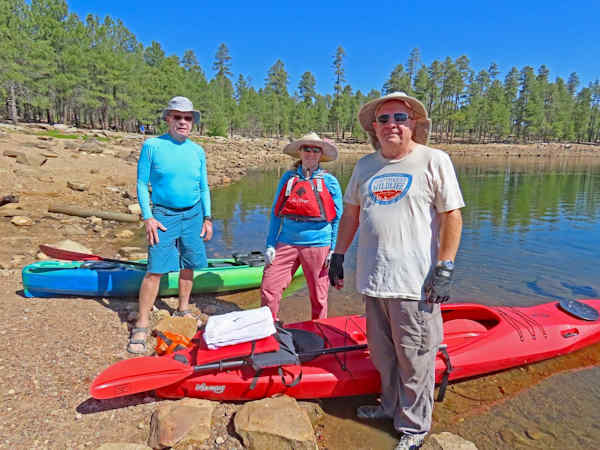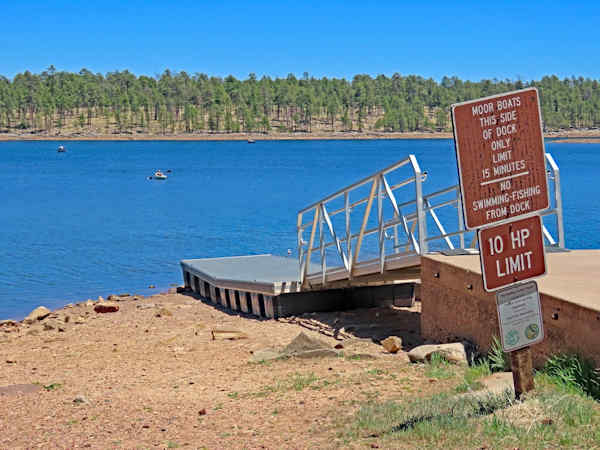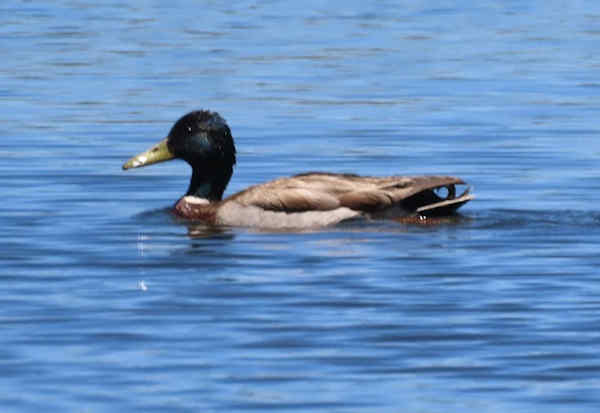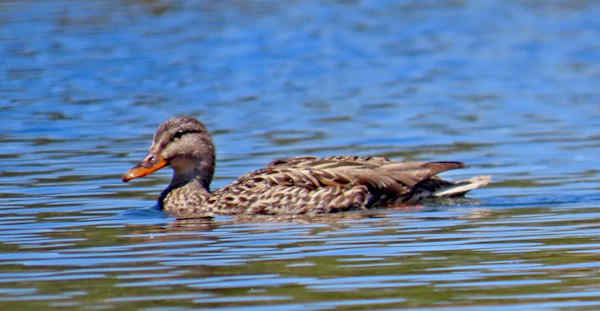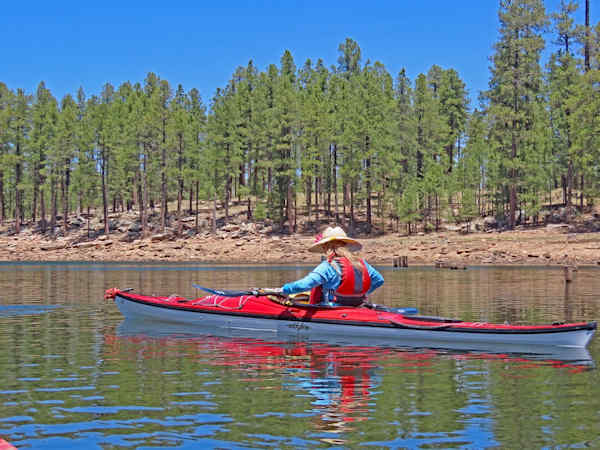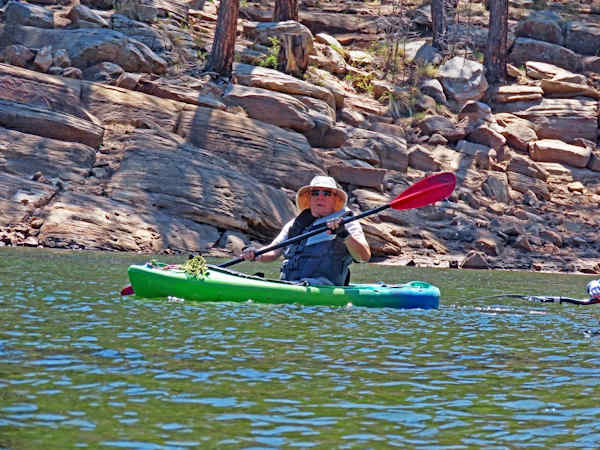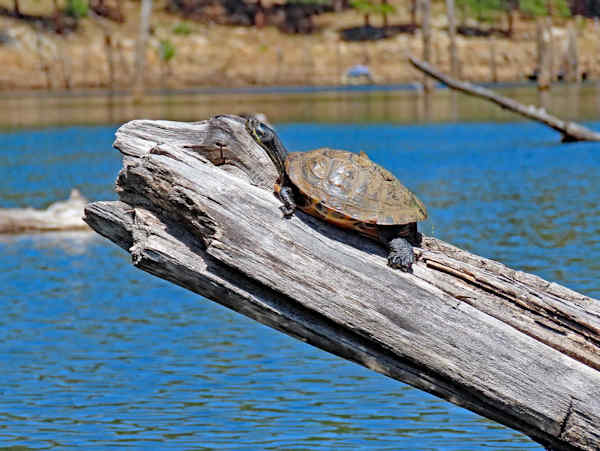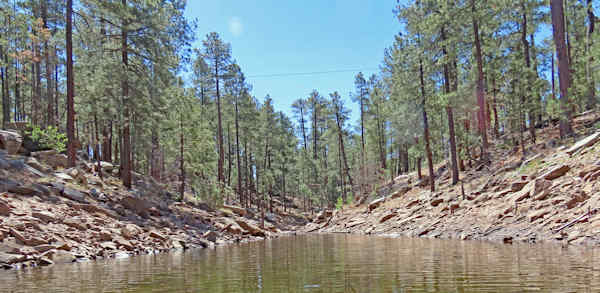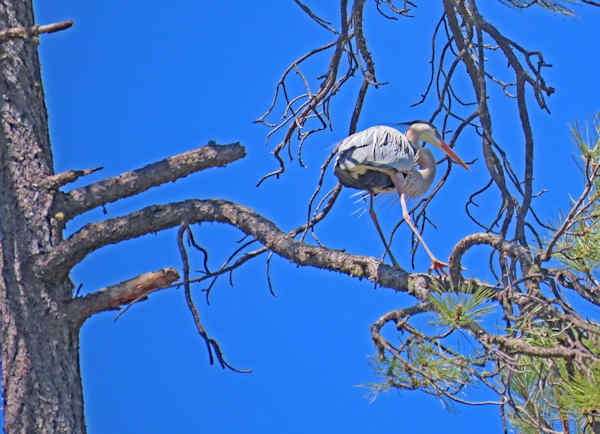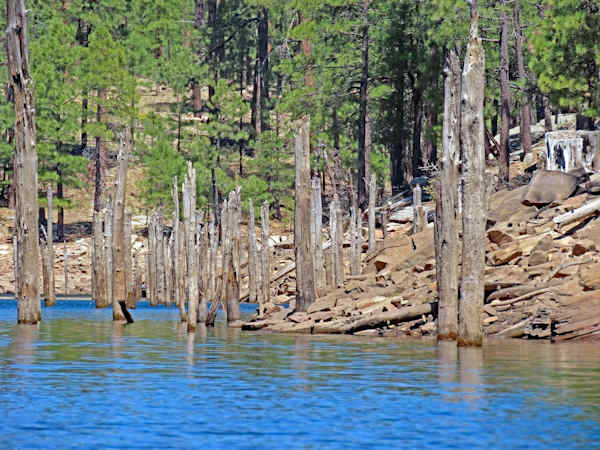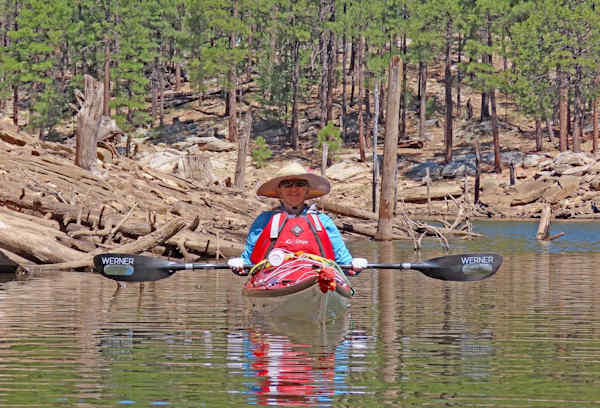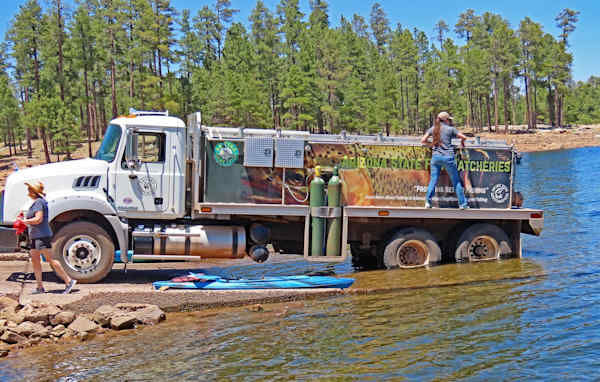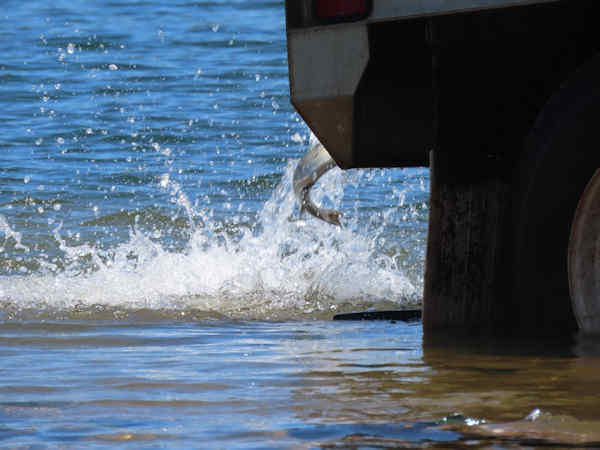
Outdoor Links
Hike Arizona
Trip Planning Guide
Trip Report Index
Calendar of Events
Library
|
Willow Springs Lake Kayak Mogollon Rim May 21, 2025 by Chuck Parsons |
|||||||||||||||||
On our last kayaking trip to Willow Springs Lake in June, 2024, the lake was at 100% capacity. Today, as we look around miles of exposed rocky shoreline and a floating dock completely out of the water, we estimate the lake level has dropped between eight and ten feet. But there’s still plenty of lake left to kayak in, so three of us begin prepping our kayaks for launch. There were originally eight people signed up for this kayaking trip, but after changing the trip date from Monday to Wednesday, five of those had to cancel for various reasons.
Typically, the only reason for changing kayaking dates is dangerously high wind conditions. Monday, May 19, looked good when we originally posted this trip on our website. But weather conditions suddenly took a turn for the worse, with steady winds of 14 to 18 mph, gusting to 28 mph, a high of only 53 degrees for the day, and a 30% chance of rain showers and thunderstorms predicted for Monday. And Tuesday was only marginally better. Wednesday forecast was looking much better, which thankfully proves to be the case. These high winds and the waves they generate can easily capsize a kayak. I have kayaked in these conditions before, and it is definitely not much fun. It is just far too risky, and taking an unplanned swim in these frigid lake waters at 7,500 feet can quickly lead to hypothermia.
By 9:30 we shove off from the main boat ramp area and start paddling clockwise around the lake, first toward the dam. The lake surface is glassy smooth, with hardly a ripple, as we start out. But it is not too long before a light wind kicks up and erases the glassy smooth surface. Willow Springs is an oddly shaped lake, with two long arms of water separated by a long peninsula of land thrusting northwest into the main lake body. One advantage of that configuration is a lot more shoreline to explore, which is our primary goal for the day.
After reaching the dam area, we begin paddling southeast into the eastern arm of the lake, the longest of the two main lake arms. Since the lake is almost ten feet down, we know we can’t paddle as far as we normally do to the very end when the lake is full or almost full. At one point we see a colorful turtle sunning itself at the end of a long tree limb jutting out over the water. And it is not too long before I accidently bottom out in soft mud after going just a little too far to the end. I certainly do not want to exit my kayak in this soft mud since I would probably sink in a foot or more, so I keep polling myself out of the mud with my paddle and eventually break free and get into deeper water. Whew! That was a little too close for comfort. We all turn around and begin paddling back out into the main lake body.
We then round the tip of the peninsula and begin paddling southeast once again down the western arm of the lake. So far, we’re only seeing light winds that help cool us off as the day gradually begins to warm up under bright blue, cloudless skies. I had mentioned earlier that I was surprised we had not seen a single bald eagle or osprey so far after being on the water for over an hour. Finally, we see one, then two, and eventually three ospreys circling and riding the thermals high overhead, as they scan the waters below for signs of fish near the surface. We also spot a couple of great blue herons perched high in the tall pines right at water edge. An unusual sighting, since we normally see these large birds stalking the shoreline in search of fish. They could be searching for a nesting site in the trees.
After paddling around the western lake arm, we start looking for a good place to beach our kayaks and get out for a lunch and rest break. But between the low lake level and all the exposed rocky shoreline, this is proving to be a real challenge. Finally, we decide to go back to the main ramp area we launched from earlier. After three hours on the water, by 12:30 we paddle ashore adjacent to the ramp, pull our kayaks up from the water’s edge, and look for a shady area to sit down and have lunch. Sometime after 1:00 an Arizona Game & Fish hatchery truck pulls up near the ramp, and everyone along the shore gets into position to watch and photograph the release of hundreds of trout into the lake waters. This is always a big event at the lake, attracting lots of onlookers.
The sole Game & Fish employee (normally two people are running this operation), an attractive young woman with a long auburn ponytail poking out from beneath her tan baseball cap and wearing blue jeans with a gray AZ Game & Fish T-shirt, carefully works her way around the narrow catwalk that runs all the way around the back of the tanker truck. She then opens a large tank cover and uses a dip net to remove some floating debris on the water surface, before finally opening a large flush valve at the back of the hatchery truck and releasing hundreds of squirming and thrashing trout into the lake. This is quite a spectacle to observe, and we never get tired of watching after seeing it several times already.
After the release is completed, she pulls the hatchery truck up from the ramp, parks it in the general parking area, and walks back down the ramp to check things over one last time, looking for any floating or injured fish. As she is walking back to the truck, I ask her a few questions and learn that she just released both rainbow trout and a new hybrid species, tiger trout, a cross between brook and brown trout. Game & Fish stocks trout from several different fish hatcheries from April thru September in the seven Rim Lakes. She also tells me that smallmouth bass, largemouth bass, and green sunfish have been illegally released into the lake, and the bass have become major predators of the trout, depleting their numbers faster than normal. You learn something new every day. By 2:00 p.m. we decide to call it a day and start loading up all our gear and kayaks for the long drive back to the Phoenix and Mesa areas. It has been another great day for kayaking the Rim Lakes of Arizona’s scenic Mogollon Rim.
|
|||||||||||||||||
 Top of Page Top of Page
|
Arizona Trailblazers Hiking Club, Phoenix, Arizona updated June 7, 2025 Comments? Send them to the AZHC . |
